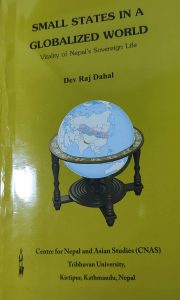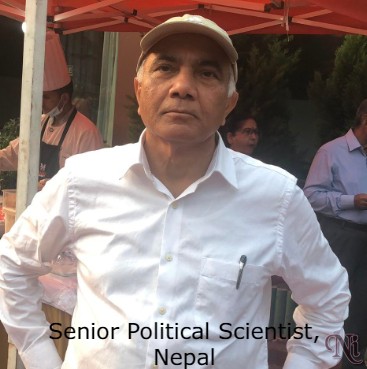Dev Raj Dahal
Senior Political Scientist
Tribhuvan University
Kirtipur. Kathmandu, Nepal
Begin text:
The processes of globalization have helped Nepal to participate in the global labor market beyond the neighborhood, enlarge its diplomatic and strategic gaze, utilize brain gain and participate in the exchange of ideas, capital, technology, communication, trade and tourism and universalize its legitimate needs, aspirations and concerns.
Yet the euphoria of the borderless world sparked by the post-Westphalian spirit of globalization has failed to withstand several challenges of international proportion: future of artificial intelligence, space races, climate change, economic crisis, pandemic, anti-migration current, the rise of nationalism, fundamentalism and geopolitics, bioterrorism, swelling of poverty, inequality and loss of jobs and a serious setback for the policy of multilateralism. In the absence of effective global governance, many of these factors have increased awareness of scholars, leaders and policymakers of small states about their vulnerability to global forces facing capacity deficits in coping with them in the absence of regional and international cooperation.
The emergence of polycentric world order induced by globalization has opened possibilities for many small states like Nepal to look beyond neighbors and harness its aspiration for global belonging defined by its classic cosmopolitan ideals and superhuman source of knowledge rooted in the cosmic web of life and perform corresponding duties to life-vitalizing species, citizens and humans.
Their resilience has provided an enduring vitality of Nepali sovereign life and has inspired its leaders to take lessons from history of external self-determination.
Yet, the need to protect national borders, culture and values has become imperative to avoid the fear of being a loser to global forces beyond state control and their interrelated effects on national identity.
The bigger gaze of progress offered by globalization has been set aside by powerful states’ relentless drive to maximize unbounded financial profits over the real economy, nature, human and small states’ life.
Nepal, a relatively small state wedged between two continental-size neighbors, India in the east, south and west and China in the north, forms the geopolitical heartland of Asia. It is persistently engaged in an age old search for national survival, security, identity and progress between incompatible and often clashing aspirations of neighbors to become global powers. Globalization has augmented their power, wealth and outreach and motivated a thrilling economic, military and strategic race to fulfill their global ambitions and alluring geostrategic shift marked by the Asianization of world politics.
It is propelled by Confucian, Hindu Buddhist and Islamic Asia’s economic and technological dynamism as a whole. The condition of regional disharmony and global anarchy has entailed Nepal to rediscover its classical middle path for stable existence and build community, connection and solidarity at various scales to pursue a balancing act. Competition between neighbors has given Nepal considerable room to maneuver and its balancing tact has set a context in which it has significant autonomy to pursue its foreign policy objectives. The size of a state does not define the scale of wisdom it upholds in creating just and peaceful order. Small states have greater interest, stake and imperative to keep themselves afloat by their own intrinsic will and acquired capabilities and evade the Darwinian reflex of world politics.
Nepal can exercise its option to choose nearby and distant friends, not neighbors.
It has to live with them but cautiously defy any extension of their undesirable policies adverse to its internal social cohesion. Prudent diplomatic defiance is a basic precondition for its sovereignty security, stability and endogenous progress fulfilling essential needs of citizens so that they can look for better choices.
The entrenchment of the reasons of the state above neighbors and agencies of distant great powers, internal special interest groups and non-state forces can enable Nepali state to engage in promoting public and national interests and rekindle the resilience of positive forces alive in the society. Its relative smallness did not deter its sages, statesmen, soldiers, poets, artists and historians to think wisely in universal terms and struggle for a just order at various scales based on freedom, equality, justice and reciprocity It is vital to attain the common good so that Nepalis do not have to leave their motherland in search of unsafe jobs abroad to support the families, communities and the state. Its heritage of enlightenment and love for national self-determination on matters of conducting politics, law and development policies are finding popular resonance now.

Prudent policies, refined by years of experience, can help evade any concept of geopolitical determinism or economic reductionism and offset the drawbacks of being a small state. An awareness of it geography and geopolitical pulls offer Nepali security and foreign policy makers strategic thought to adopt positive neutralism in the neighborhood and nonalignment in international relations and cogent foresight to define relationships with international regimes and address the power of their gravity.
It is not gratifying to say that Nepal as an ancient civilizational state has provided asylum to refugees-Buddhists, Muslims, Indian freedom fighters, Tibetans and Bhutanese. It was possible because politics was then embedded in the state, non-government actors complied with the laws of the land and the state could pursue universal dharma, without flagging the state-society ties. Nepali leadership imbued with the native enlightenment vision and values did not deviate from their areas of common national sentiment and dharma of serving public, national and cosmopolitan interests.
There was no need for leaders to be disciplined by the verdict of the Supreme Court, public protests, media and civil society criticism as it has become common recently.
Nepal as a small state, therefore, needs partisan-free foreign policy, rely on the wisdom of historical and conceptual crutches of the earlier period and seek the discursive formation of national consensus so that the state, polity, government, political parties, business, civil society and citizens strut in a concert to mobilize political will, resources and energy for nation building, assume collective responsibility in the execution of ends and means of foreign policy and cheer up with designing the judicious diplomatic strategies of “hedging, balancing and band wagoning” and combination thereof, when being pulled by the cross-pressure of India, China, the U.S., Russia, Europe or other great powers. Nepal’s pro active role in international politics can be considered a self-protective foreign policy.
It, however, demands Nepali intellectuals, bureaucrats, policymakers and opinion shapers furnish well-reasoned stakes of great powers in the state, build rational and national character, overcome the flaws of offensive politics of “we” and “they” and transform the notion of an enemy into constructive opposition who can collectively identify with Nepaliness, fuse territoriality, nationality, citizenship, economy and sovereignty in the state and achieve the foreign policy objectives underlined in the Constitution of Nepal.
It makes the future better than the past and skirts the spiral of negative geopolitical maneuvers and builds partnership with the nature. To attain the best outcome in a globalized environment that is in flux, uncertain, unstable and contested, leaders have to plot cautious pathways, strengthen its foreign ministry, embassies and missions abroad equipping them with scholars’ back up of creative insights, policies and strategies, appease the friendly nations and adapt to the zeitgeist with coherent foreign policy approach consistent with protection and promotion of core national interests while becoming eager to cooperate on mutually beneficial areas.
End text.
# Text courtesy: Excerpts from the recently published book, (2022) “Small States in a Globalised World”, by Centre for Nepal And Asian Studies ( CNAS), Tribhuvan University, Kirtipur, Kathmandu, Nepal.
# The entire editorial board of the telegraphnepal.com is highly indebted to the senior political scientist of Nepal, Professor Dev Raj Dahal and the Executive Director of the CNAS Dr. Mrigendra Bahadur Karki.
# published in the larger interest of the global audience: Chief Ed.
Our contact email address is: editor.telegraphnepal@gmail.com

